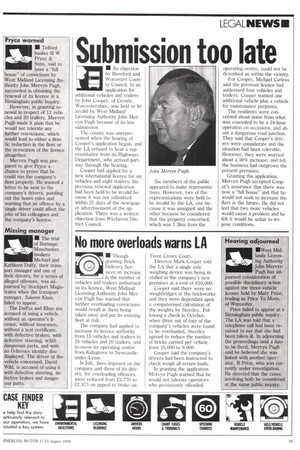Submission too late
Page 21

If you've noticed an error in this article please click here to report it so we can fix it.
• An objection by Hereford and Worcester County Council, to an application for additional vehicles and trailers by John Cooper, of Crowle, Worcestershire, was held to be invalid by West Midland Licensing Authority John Mervyn Pugh because of its late submission.
The county was unrepresented when the hearing of Cooper's application began, and the LA refused to hear a representative from its Highways Department, who arrived partway through the hearing.
Cooper had applied for a new international licence for six vehicles and eight trailers: his previous renewal application had been held to be invalid because it was not submitted within 21 days of the newspaper advertisement of the application. There was a written objection from Wychavon District Council. Six members of the public appeared to make representations. However, two of the representations were held to be invalid by the LA, one because it was unsigned and the other because he considered that the property concerned, which was 1.3km from the operating centre, could not be described as within the vicinity.
For Cooper, Michael Carless said the previous licence had authorised four vehicles and trailers. Cooper wanted one additional vehicle plus a vehicle for maintenance purposes.
The residents were concerned about noise from what was conceded to be a 24-hour operation on occasions, and about a dangerous road junction. They said that Cooper's drivers were considerate and the situation had been tolerable. However, they were worried about a 50% increase, and felt the business had outgrown the present premises.
Granting the application, Mervyn Pugh accepted Cooper's assurance that there was now a "full house" and that he would not seek to increase the fleet in the future. He did not feel that two more vehicles would cause a problem and he felt it would be unfair to impose conditions.




































































































